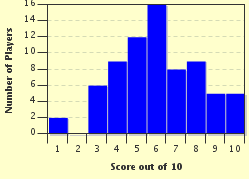Quiz Answer Key and Fun Facts
1. A is for "Ai".
This location in the region of Jericho and nearby Bethel initially saw an onslaught by the Jewish people turned into a rout. The Israelites were defeated at Ai because there was sin in their camp, specifically caused by a man named Achan.
How many Jewish soldiers were killed when they first attempted to conquer Ai?
(This incident is recorded in the 7th chapter of Joshua, in the Holy Bible.)
2. B is for "Boy".
When King David was a boy he tended his father's sheep. The prophet Samuel came by to anoint the future king, not knowing which of Jesse's sons was to become the future leader of Israel. How many of Jesse's sons did he have to reject first, before God allowed him to know that David was His choice?
3. C is for "Conscience".
In Paul's first letter to a young pastor named Timothy, he wrote that near the end of this earth age some people would have a conscience that no longer functioned properly.
4. D is for "Days".
In Mark 13:20 we read an account that is measured in days, not weeks or months. What type of "days" was Mark referring to in this particular passage?
5. E is for "Evil."
Romans 12 gives us good advice about how to deal with evil. What does it say Christians should do to combat evil in this world?
6. F is for "Favorite."
Jacob, whose name was later changed to "Israel" had one daughter and twelve sons.
Who was the favorite son of the Old Testament patriarch, Jacob?
7. G is for "Glean."
Many people are familiar with the story of Ruth, an ancestor of Christ, and they are aware that she "gleaned" in the fields of her soon-to-be second husband, Boaz.
In which Old Testament/Tanakh book was it commanded that poor people should be allowed to glean in the fields?
8. H is for "High and lifted up."
Which Old Testament prophet used these words to describe a vision that he had of God upon His throne?
9. I is for "Imaginations."
We often think of having a good imagination as being a positive thing. The apostle Paul warned of imaginations that were not so good, however. In which book of the New Testament can we read the following verse?
"Casting down imaginations, and every high thing that exalteth itself against the knowledge of God, and bringing into captivity every thought to the obedience of Christ;"
10. J is for "Judgment."
Which of the "minor prophets" spoke of God's judgment in this way?
"And he shall judge among many people, and rebuke strong nations afar off; and they shall beat their swords into plowshares, and their spears into pruninghooks: nation shall not lift up a sword against nation, neither shall they learn war any more."
Source: Author
logcrawler
This quiz was reviewed by FunTrivia editor
agony before going online.
Any errors found in FunTrivia content are routinely corrected through our feedback system.


